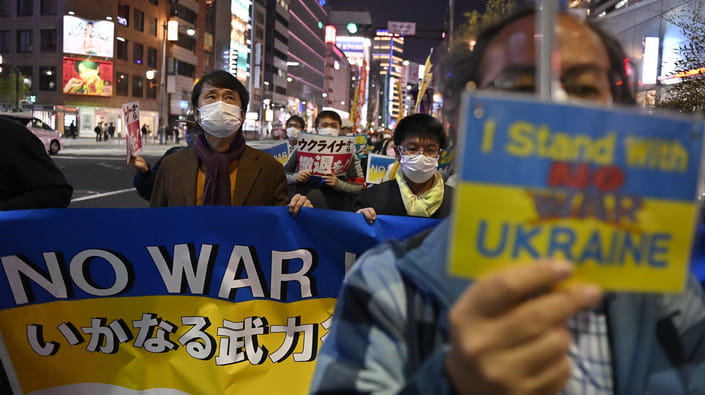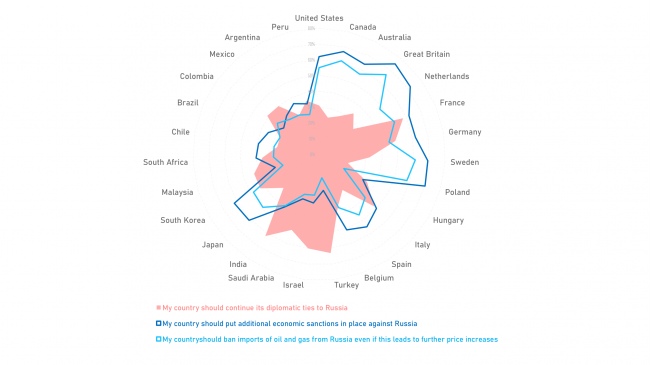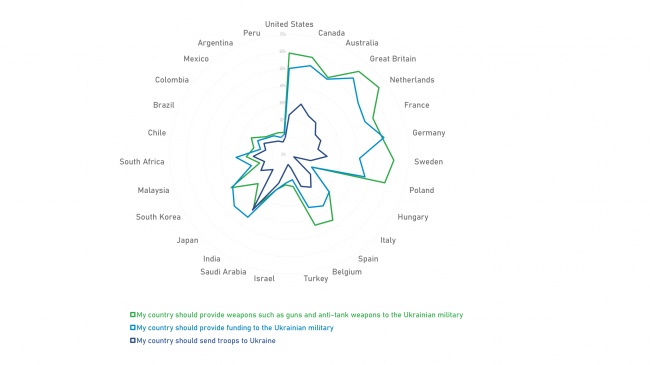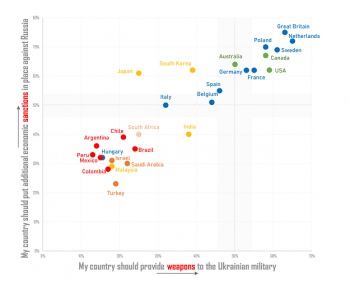World’s Support to Ukraine: Which Countries Support Providing Weapons to Ukraine and Sanctions against Russia

Back in the spring, the international research firm Ipsos surveyed 27 countries on their response to the war in Ukraine. We should admit some states favor Ukraine, but the study did not mention them. So the analysis is about absolute allies or absolute enemies but only about relative indicators.
It is also important to understand that it is about the mood of societies, which may or may not coincide with government policies.
However, the study makes it possible to compare countries' loyalty to Ukraine and show trends in public opinion of the world community.

The questions were not only about Ukraine but also about Russia's perception in general. For example, the British, Canadians, Americans, Poles, Dutch, and Swedes are among the biggest supporters of imposing additional economic sanctions on Russia. They tend to support general sanctions more than the ban on Russian oil (if it affects rising prices). But there is also relatively high support for the ban on oil imports.
In particular, the countries that want to continue relations with Russia and, accordingly, do not want to spoil them with sanctions are, first of all, Turkey and Israel. India and Saudi Arabia, which also have relatively important ties with Russia, gave similar answers.
Latin American countries are far from the context of Ukrainian-Russian relations. So they do not support sanctions, but their ties with Russia are not so important. The rest of the countries are mostly on the Ukrainian side, mainly Europe, North America, and Australia - they are in favor of sanctions and do not want friendship with Russia. Developed Asian countries come along: South Korea and Japan, but not Malaysia.
However, there are exceptions among European countries.
In particular, neighboring Hungary is sharply "falling out" of the European trend of supporting Ukraine. The people of France, Germany, and Italy are affected by double standards. On the one hand, they support sanctions against the aggressor, but meanwhile, they are not ready to give up friendly relations with Russia.
The commitment to providing Ukraine with is also interesting. Again, the people of Europe and North America are relatively unanimous on this issue. A majority supports military assistance and aid to the Ukrainian army. Hungary and Italy are out of this trend.

Society as a whole is more loyal to the direct provision of weapons to the Ukrainian army than to the sponsorship of Ukrainian troops.
However, for some countries, such as South Korea and Japan, financing the Armed Forces is more important than the direct provision of weapons. In the military context, sending one's armed forces to Ukraine has the lowest level of support.
But India is phenomenal in this case. Despite the lack of support for the economic aid in the Indian society, the desire to send their troops to Ukraine is very high compared to other countries. Also, India believes the war in Ukraine has certain risks of negative consequences for them personally.
Comparing the commitment to economic sanctions and providing weapons to Ukraine, we can see the following.
The most significant allies among the studied countries that support sanctions and providing weapons to the Ukrainian military are the United Kingdom, the Netherlands, Poland, Sweden, Australia, and the United States. The French and Germans are also close.
Australia, Spain, and a little more doubt South Korea and Japan agree to support economic sanctions but have some doubts about providing weapons.
Belgium and Italy are not very loyal to providing weapons but relatively support economic sanctions. The rest of the countries surveyed do not have half the support for both sanctions and weapons.
The only European country surveyed in this disloyal group is Hungary.
Hungarians are more skeptical about providing weapons to Ukraine and economic sanctions on Russia than residents of India or South Africa.
India is even ahead of the Italians in terms of providing weapons. Public opinion in Turkey also has a low level of support for both options.

A small percentage of support shows a survey in Israel and Saudi Arabia. Malaysia and all Latin American countries surveyed are close to them.
For example, distant Latin American countries are quite skeptical about supporting Ukraine because of its geographical and cultural remoteness. But whether the distance is significant is a big question.
The example of the Federated States of Micronesia is worth mentioning. They severed diplomatic affairs with Russia at the beginning of a full-scale invasion. Although, apparently, in Ukraine, few people have heard about the existence of this state. If we summarize the analyzed results and, for curiosity, compare, for example, loyalty to providing weapons with geographical remoteness, we get the following results.
The population of the United States, Canada, Australia, South Korea, and India can be included in the group, which is physically located far away but is pleasantly surprised by their support to provide weapons. Most European countries can be divided into groups of physically close and those with a very high or relatively high level of support to provide weapons.
Another group is geographically remote countries, where support for weapons is correspondingly low. It is slightly higher among South Africans, Brazilians and Japanese.
But Turkey, Israel, and Hungary, which are not so loyal to providing weapons to Ukraine, are among the relatively problematic countries that are not so far from the European context and should, in theory, be more inclined to support Ukraine.
We should understand that most members of the European family are relatively loyal even to the direct support of the Ukrainian armed forces. They understand the threats of this war not only for European values but also for them personally.
At the same time, Ukraine has many friends outside of Europe: both on the American continent and, as it turns out, among Asian countries.
Therefore, public support for the pro-Ukrainian trend among many countries gives hope for the steadfastness of political positions in favor of Ukraine at the highest levels of the states.
Tetyana Skrypchenko,
analyst of the Sociological Group "Rating"